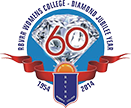Program Specific Objectives
- Bachelor of Science in Computer Science is to prepare students for successful careers and for advanced graduate study in computer science.
- To impart knowledge of a broad range of Computer Science skills, tools, and mathematical techniques, and the capability of applying them to analyze and design complex systems.
- To make them understand fundamental theoretical and practical concepts in Computer Science.
- Build the ability to adapt to an ever-changing technological landscape.
- Impart capability of solving a wide variety of problems by applying principles of computational thinking.
- Inculcate habits of working effectively and professionally on diverse project teams.
- Induce the ability to communicate technical information clearly and effectively, both orally and in writing.
- Facilitate them to understand how to approach social effects of computing ethically and responsibly, and being committed to doing so.
- Imbibe interest in life-long learning, to adapt and shape an evolving world.
- Instill the ability to participate in interdisciplinary collaborations and apply computational methods in new and unfamiliar domains.
Program Specific Outcomes
-
1. Impart an understanding of the basics of our discipline.
Each graduated student should be able to:
- Apply fundamental principles and methods of Computer Science to a wide range of applications
- Apply mathematical and scientific reasoning to a variety of computational problems
- Design, correctly implement and document solutions to significant computational problems
-
2. Develop proficiency in the practice of computing.
Each graduated student should be able to:
- Formulate solutions to computing problems
- Analyze and compare alternative solutions to computing problems
- Design and implement software systems that meet specified design and performance requirements
- Apply advanced algorithmic and mathematical concepts to the design and analysis of software
- Apply sound principles to the synthesis and analysis of computer systems
-
3. Prepare for continued professional development.
Each graduated student should be able to:
- Work effectively in teams to design and implement solutions to computational problems
- Communicate effectively, both orally and in writing
- Think critically and creatively, both independently and with others
- Recognize the social and ethical responsibilities of a professional working in the discipline
- Adapt to new developments in the field of computer science






